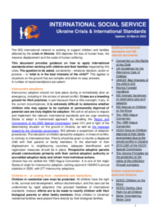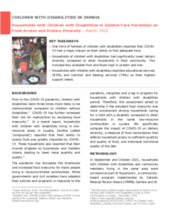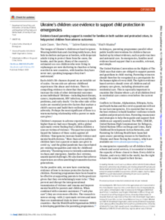Displaying 1171 - 1180 of 10391
Ce document fournit des conseils sur la manière d'appliquer les normes internationales lorsque vous travaillez avec des enfants et leurs familles touchés par cette crise. La question à poser, systématiquement - quelle que soit la décision, l'action ou le processus - est "qu'est-ce qui est dans l'intérêt supérieur de l'enfant?" Cela s'applique à des situations sur le terrain qui sont complexes et ne permettent pas de réponses faciles.
Este documento brinda orientación sobre cómo aplicar los estándares internacionales cuando se trabaja con niños y sus familias afectados por esta crisis. La pregunta que se debe hacer, de manera consistente, sea cual sea la decisión, acción o proceso, es "¿qué es lo mejor para el niño?" Esto se aplica a situaciones sobre el terreno que son complejas y no permiten respuestas fáciles.
This document provides guidance on how to apply international standards when working with children and their families impacted by this crisis. The question to be asked, consistently – whatever decision, action or process – is “what is in the best interests of the child?” This applies to situations on the ground that are complex and allow no easy answers.
This article examines the challenges that internally displaced children face in the midst of COVID-19. The article investigates the level of protection that the displaced children have and what social and medical mechanisms have been put in place to cater for them during the pandemic.
The purpose of this study was to examine socio-economic and mental health impacts of COVID-19 on South African adolescent girls and young women (AGYW) in order to understand how additional challenges brought on by COVID-19 have intersected with existing challenges, compounding AGYW vulnerabilities.
This systematic review aims to examine the effectiveness of interventions that seek to improve outcomes of grandchildren raised by grandparents.
This video explains the implementation of the UN Convention on the Rights of Persons with Disabilities in the European Union. The Committee is checking if the EU made progress in the implementation of the UN Convention on the Rights of Persons with Disabilities since 2015. The European Network on on Independent Living (ENIL) submitted a shadow report to the Committee. This video explains what you can find in ENIL's shadow report.
This video explains the implementation of the UN Convention on the Rights of Persons with Disabilities in the European Union. The Committee is checking if the EU made progress in the implementation of the UN Convention on the Rights of Persons with Disabilities since 2015. The European Network on on Independent Living (ENIL) submitted a shadow report to the Committee. This video explains what you can find in ENIL's shadow report.
This summary report by Catholic Medical Mission Board (CMMB) Zambia and St Catherine's University reports the impact of COVID-19 on the ability of families of children with disabilities to access adequate food. These households named educational and nutritional services as their most pressing support needs.
This opinion piece published in the BMJ, argues that evidence based parenting support is needed for families in both sudden and protracted crises, to help protect children from adverse outcomes. The authors say that in emergencies, families need evidence based support that is accessible, relevant, and simple. The parenting programmes prevent and disrupt the intergenerational transmission of violence and trauma and improve mental health for parents and children. When combined with economic assistance (“‘cash plus care”) they are even more effective.







